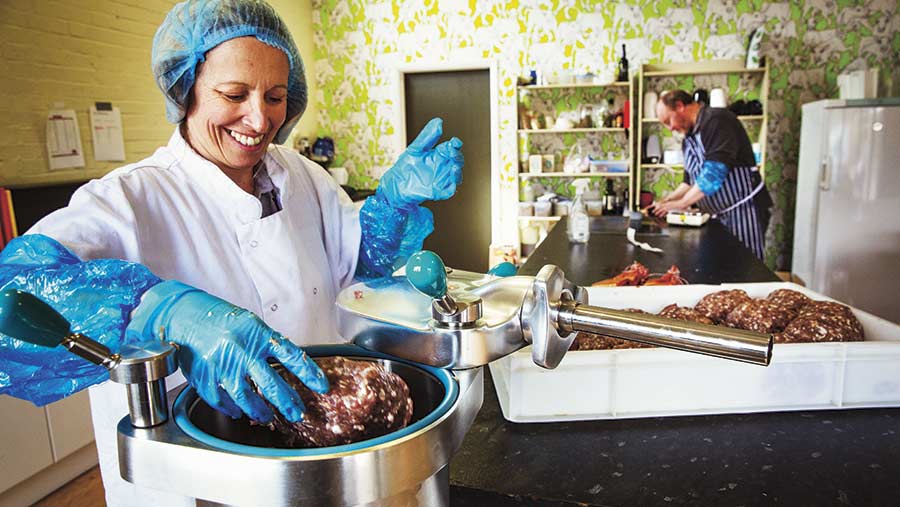Should you diversify? What to consider
 © Mint Images / Rex Shutterstock
© Mint Images / Rex Shutterstock How is your existing business doing? That’s the first question to ask when thinking of diversifying, says rural business consultant Hannah Moule.
The starting point is to examine what might be improved in the core business.
Check the core business first
- Benchmark it against similar businesses/standards – several small changes or improvements can make a big difference and there are some good free tools available
- Concentrate on improving small margins through better cost management, especially aiming to reduce overhead costs
- Is the enterprise mix right – don’t just look at the whole farm accounts, look at enterprise accounts – what impact is each enterprise having on the others?
- Would it be better to put effort into expanding the existing business?
Once that is done, then researching any new venture can begin.
“The smart approach is to start small with a venture that doesn’t take a lot of capital or so much of your time that you take your eye off the ball as regards your farming endeavours,” says Ms Moule.
See also: Top tips on farm retailing
Be the customer
Visit as many farm-based enterprises as you can to soak up ideas and experience. Don’t worry about coming up with the next big idea – the vast majority of farm diversifications reproduce what others have done, just in a different place. Time spent looking at how others do things, well or badly, is invaluable, even if that means your venture gets off the ground later than you would like.
Time trial
All alternative enterprises will demand your time and effort but there is a vast range – some require more time at the outset and set up, while more active and public-facing businesses, such as tourism, attractions and farm shops, demand an increasing amount of your time. Be realistic about those you are considering and ask yourself if you are suited to them.
 Hannah Moule is managing director of rural business consultancy Moule & Co, which recently launched www.thebusinessbarn.co.uk, a website aimed at helping rural entrepreneurs launch a or expand a fledgling business.
Hannah Moule is managing director of rural business consultancy Moule & Co, which recently launched www.thebusinessbarn.co.uk, a website aimed at helping rural entrepreneurs launch a or expand a fledgling business.
Value your time – what is it worth?
Should you be spending your time doing tasks such as book-keeping? Unless you have a passion for this, buy in services as soon as you can, it will save you time.
Type of enterprise
Think broadly. While using existing assets, such as land and buildings, may be an obvious first choice in many cases, it may be that your venture could rent in premises, for example a mobile unit, or use existing facilities elsewhere, such as a cookery school renting kitchens in stately homes – this can reduce your risk and demand less capital.
Staff
Many successful enterprises involve extra staff – sometimes hundreds. No-one goes into business to manage people, so make sure it’s what you want to do and get help with the people management as soon as you can afford it. It doesn’t have to be expensive, there are templates for employment contracts which will do the job, rather than you trying to write them from scratch.
If you get the staff management right, they will do a lot of your marketing for you.
Flexible working
This can apply either to rotas and shift patterns or to working from home and is likely to be important to your staff, many of whom may have children or other family care commitments. Make an effort to accommodate this – you will be rewarded with good loyal staff.
Funding and cash flow
Many are tempted to fund the new venture through the farm business, but this can put too much strain on the core business and its cash flow, so consider setting up with an independent funding source, even if that means getting a loan. Farm assets can still be used as security.
Tax planning
Check whether it’s best to set up the new enterprise within the existing business or separately. If the new business grows rapidly, it can be complicated to separate the two a few years down the line.
Planning
Aside from getting planning permission, which often takes far longer than is ideal, other aspects can take more time than expected. For example, getting broadband services set up, also administrative aspects such as wedding permits, alcohol licences and other permissions, so allow for this and plan well ahead.
Image
Sorting out branding and logos can also soak up far more time than you want it to, so consider using online services, which you can brief. Many freelance designers work in this way and will pitch ideas to you free of charge.
Time-saving ideas
If you are public-facing, the public will be interested in what you do both on the farm and in the alternative enterprise – save yourself time by designing useful information/welcome/fact packs about the business or the area.
Use trade associations – they often give advice and offer valuable information, for example UK Farma, the organisation for farm retailers and farmers’ markets.
